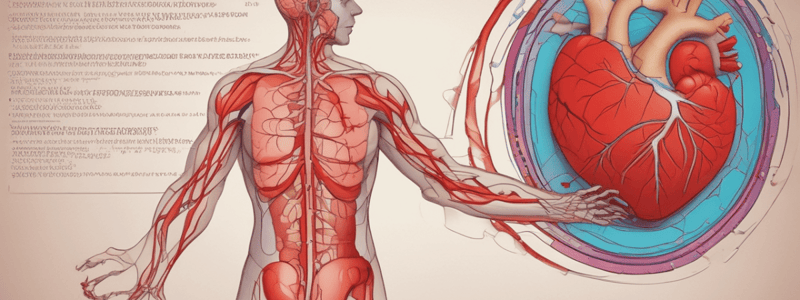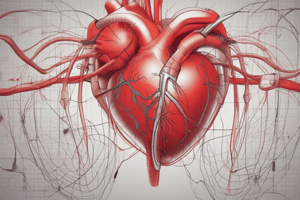Podcast
Questions and Answers
What is the primary mechanism by which the autonomic nervous system regulates cardiac function?
What is the primary mechanism by which the autonomic nervous system regulates cardiac function?
- Directly stimulating the heart muscle
- Releasing hormones that affect the heart
- Sending signals to the sinoatrial node (correct)
- Inhibiting the parasympathetic nervous system
Which of the following is an example of a local factor that controls cardiac function?
Which of the following is an example of a local factor that controls cardiac function?
- Increase in oxygen demand by the heart muscle (correct)
- Release of epinephrine from the adrenal glands
- Decrease in blood pressure detected by baroreceptors
- Stimulation of the vagus nerve
What is the primary function of the parasympathetic nervous system in regulating cardiac function?
What is the primary function of the parasympathetic nervous system in regulating cardiac function?
- Decreasing heart rate and contractility (correct)
- Increasing heart rate and contractility
- Stimulating the release of antidiuretic hormone
- Regulating blood pressure through vasodilation
Which of the following is a consequence of uncontrolled hypertension?
Which of the following is a consequence of uncontrolled hypertension?
What is the term for the ability of the body to maintain a stable internal environment despite changes in the external environment?
What is the term for the ability of the body to maintain a stable internal environment despite changes in the external environment?
Flashcards are hidden until you start studying
Study Notes
Control of Cardiac Function by Homeostasis
- Homeostasis maintains cardiac function through local, nervous, and endocrine factors
- Local factors:
- Myogenic mechanism: stretch of cardiac muscle triggers contraction
- Metabolic mechanism: changes in oxygen and nutrient availability affect contraction
- Nervous system factors:
- Parasympathetic nervous system (PNS) stimulation decreases heart rate
- Sympathetic nervous system (SNS) stimulation increases heart rate and contractility
- Endocrine system factors:
- Epinephrine and norepinephrine from adrenal medulla increase heart rate and contractility
- Atrial natriuretic peptide (ANP) from atrial muscle decreases blood pressure
Autonomic Nervous System Pathways for Changing Blood Pressure
- Baroreceptor reflex:
- Baroreceptors in aortic arch and carotid sinus detect changes in blood pressure
- Signals transmitted to medulla oblongata, then to PNS or SNS
- PNS stimulation lowers blood pressure, SNS stimulation increases blood pressure
- Chemoreceptor reflex:
- Chemoreceptors in carotid and aortic bodies detect changes in CO2 and O2 levels
- Signals transmitted to medulla oblongata, then to PNS or SNS
- Increases in CO2 and decreases in O2 stimulate SNS, increasing blood pressure
Pathophysiology of Hypertension
- Hypertension: sustained blood pressure >140/90 mmHg
- Factors contributing to hypertension:
- Increased peripheral resistance
- Increased cardiac output
- Renal dysfunction
- Hormonal imbalances
- Genetic predisposition
- Consequences of hypertension:
- Cardiovascular disease
- Stroke
- Kidney disease
- Retinopathy
Studying That Suits You
Use AI to generate personalized quizzes and flashcards to suit your learning preferences.




